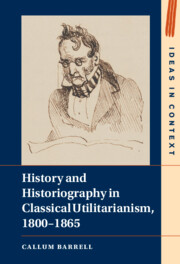Refine search
Actions for selected content:
5 results
19 - ‘Freedom Is the Sure Possession’: Modern Receptions of Pericles’ Funeral Oration
- from Part V - The Language of Democracy
-
-
- Book:
- The Athenian Funeral Oration
- Published online:
- 11 January 2024
- Print publication:
- 01 February 2024, pp 414-435
-
- Chapter
- Export citation
13 - Hellenism, Hebraism, and Heathenism in Nineteenth-Century England
- from Part VI - Intellectual Superstars
-
-
- Book:
- Victorian Engagements with the Bible and Antiquity
- Published online:
- 28 September 2023
- Print publication:
- 12 October 2023, pp 358-384
-
- Chapter
- Export citation
Conclusion
-
- Book:
- History and Historiography in Classical Utilitarianism, 1800–1865
- Published online:
- 24 September 2021
- Print publication:
- 07 October 2021, pp 220-225
-
- Chapter
- Export citation
Introduction
-
- Book:
- History and Historiography in Classical Utilitarianism, 1800–1865
- Published online:
- 24 September 2021
- Print publication:
- 07 October 2021, pp 1-20
-
- Chapter
- Export citation

History and Historiography in Classical Utilitarianism, 1800–1865
-
- Published online:
- 24 September 2021
- Print publication:
- 07 October 2021
